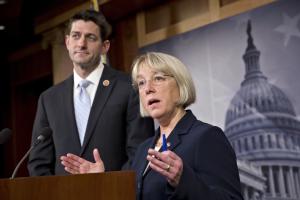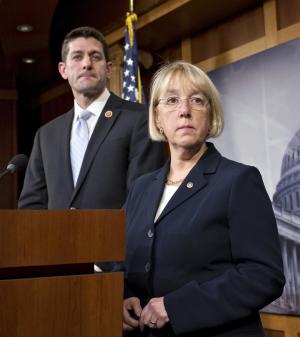The Hill

Lauren Schneiderman
By Vicki Needham, Mike Lillis and Bernie Becker - 12/11/13 05:15 PM EST
The
budget deal worked out by House and Senate negotiators is on the verge
of unraveling over the exclusion of federal unemployment benefits,
several leading Democrats warned Wednesday.The lawmakers are outraged by a GOP move to add the Medicare “doc fix” to the package but not a continuation of unemployment benefits — a strategy they say could sink the entire package by scaring away Democratic votes.
ADVERTISEMENT
Van Hollen echoed that message.
“This does now add a new dynamic that could upset the applecart that could put at risk the budget agreement,” he said.
It's not clear whether Democrats would sink the first bipartisan budget deal in years over the unemployment insurance (UI) issue. But with GOP leaders intent on leaving town on Friday — and with GOP leaders showing little appetite to extend the benefits before they expire on Dec. 28 — the Democrats' only real leverage is to threaten to do so.
“Obviously, once the budget passes you don't have much leverage in terms of votes on things that remain,” House Minority Whip Steny Hoyer (D-Md.) said Wednesday. “That may be the last vehicle.”
Some Democrats on Wednesday morning appeared poised to back the Ryan-Murray budget agreement. But they also cautioned that the addition of the Medicare language without a UI extension could erode that support.
“It's something we should do, but why wouldn't we do unemployment insurance if we're doing that?” House Minority Leader Nancy Pelosi (D-Calif.) asked Wednesday morning after a meeting of her caucus in the Capitol.
Read More Here
.....
Yahoo News
Bipartisan budget deal sets off some grumbling
House and Senate floor votes are being sought on the plan announced Tuesday by Republican Rep. Paul Ryan and Democratic Sen. Patty Murray, and applauded by the White House, with the aim of securing passage before lawmakers go home for the holidays.
But skepticism surfaced in both the Democratic and Republican caucuses.
Sen. Tom Coburn, an Oklahoma Republican and leading deficit hawk, panned the new deal in an interview Wednesday, saying it fails to address core issues of wasteful spending in Washington. He said it was probably "the best" that Ryan and Murray could get at this time. But said he was disappointed in its failure to address core fiscal issues such as duplication and wasteful spending in Washington.
The agreement, among other things, seeks to restore $63 billion in automatic spending cuts affecting programs ranging from parks to the Pentagon. The deal to ease those cuts for two years is aimed less at chipping away at the nation's $17 trillion national debt than it is at trying to help a dysfunctional Capitol stop lurching from crisis to crisis. It would set the stage for action in January on a $1 trillion-plus spending bill for the budget year that began in October.
The measure unveiled by Ryan, R-Wis., and Murray, D-Wash., blends $85 billion in spending cuts and revenue from new and extended fees — but no taxes or cuts to Medicare beneficiaries — to replace a significant amount of the mandated cuts to agency budgets over the coming two years.
The package would raise the Transportation Security Administration fee on a typical nonstop, round-trip airline ticket from $5 to $10; require newly hired federal workers to contribute 1.3 percentage points more of their salaries toward their pensions; and trim cost-of-living adjustments to the pensions of military retirees under the age of 62. Hospitals and other health care providers would have to absorb two additional years of a 2-percentage-point cut in their Medicare reimbursements.
The plan doesn't attempt to resuscitate earlier attempts at an accommodation that would have traded tax hikes for structural curbs to ever-growing benefit programs like Medicare and Social Security. But it would at least bring some stability on the budget to an institution — Congress — whose approval ratings are in the gutter.
"Our deal puts jobs and economic growth first by rolling back ... harmful cuts to education, medical research, infrastructure investments and defense jobs for the next two years," Murray said.
Ryan is set to pitch the measure to skeptical conservatives at a closed-door GOP meeting on Wednesday. Democrats are set to discuss it as well, but the measure won an immediate endorsement from President Barack Obama if only tepid approval from top Capitol Hill Democrats like House Minority Leader Nancy Pelosi and Rep. Chris Van Hollen, ranking Democrat on the Budget Committee.
"Tonight's
agreement represents a step toward enacting a budget for the American
people and preventing further manufactured crises that only harm our
economy, destroy jobs and weaken our middle class," Pelosi said in a
statement.
"This agreement makes sure that we don't have a government
shutdown scenario in January. It makes sure that we don't have another
government shutdown scenario in October," Ryan said. "It makes sure that
we don't lurch from crisis to crisis."Read More and Watch Video Here
.....
TPM Livewire
House Budget Dem: If There's A Medicare Payment Fix Vote, Let's See Unemployment Insurance Too

AP Photo / Charles Dharapak
Speaking to reporters on Wednesday Rep. Chris Van Hollen, the ranking member of the House Budget Committee, standing along side Rep. Sandy Levin (D-MI), said Republican lawmakers have begun pushing to include a Sustainable Growth Rate fix (often called a short term doc fix that addresses a Medicare payment problem) alongside the budget proposal introduced by House Budget Committee Chairman Paul Ryan (R-WI) and Senate Budget Committee Chairwoman Patty Murray (D-WA).
Physicians who treat patients under Medicare are scheduled to take a huge pay cut in the new year if Congress doesn't enact this "doc fix." Many lawmakers have expressed support for reversing the pay cuts baked into current law should, but such a fix is costly.
Read More Here
.....















No comments:
Post a Comment
Hello and thank you for visiting my blog. Please share your thoughts and leave a comment :)